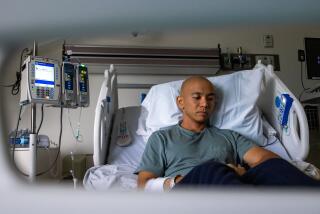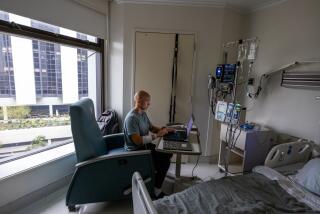Liver Transplant Offered, Then Withdrawn : Salvation Snatched From Man’s Grasp
- Share via
Hope long postponed is an agony of the mind.
Hope proffered--and then denied--is an agony of the soul.
--Richard Clement Deemes
For nearly a year now, Richard Anderson of Torrance has lived with the hope of life clipped to his belt.
Anderson, 40, needs a liver transplant to stay alive; he wears a little telephone-paging beeper that can alert him to call UCLA Medical Center, where doctors have been trying to find a donor matched to his uncommon B-positive blood type.
But the beeper remained silent--until Sunday.
“He was in church when it went off,” said the Rev. Donald Ausland, pastor of Loving Shepherd Lutheran Church in Gardena. “We saw him go out to use the phone. . . .”
And come back smiling.
The congregation, which has been praying for him, applauded and cheered as he took communion and went home to prepare for surgery.
But the operation never happened.
Two hours after the initial call, while Anderson was reminding his wife, Inez, to have the oil changed in the car and distributing last-minute hugs to his 10-year-old daughter, Holly, and 14-year-old son, Luke, the hospital phoned back to say the surgery was off.
For reasons still not explained, the donor’s relatives, who had earlier given verbal agreement, balked when it came to actually signing papers for the operation.
A spokeswoman for UCLA Medical Center said it was the first time such a thing had happened there. The donor was brain-dead, she said, and there had seemed to be no reluctance on the relatives’ part.
Nonetheless, the opportunity had disappeared.
For Anderson, a tall, gaunt man with brown eyes and an air of determinedly concealed weariness, it was just another detour in a long stretch of hard traveling.
A supermarket worker for most of his adult life, Anderson had been manager of a store in Gardena when illness forced him to give up his job a year ago.
The San Diego hospital where he had originally expected to undergo the liver transplant dropped the program when federal funding ran out last September. Another hospital--in Pennsylvania--made tests but declined to put him on its waiting list because of the distance between hospital and patient.
Anderson said he was pleased when UCLA finally accepted him, because “I feel more comfortable to be having (the operation) done close to home, close to family and friends.”
Their support, and that of church members who have raised $23,000 to help with his expenses, has been the bedrock of existence for him since the day last May when he was told he had from one to three years to live unless a transplant could be performed.
Even with the transplant, he said during an interview Tuesday, the odds are longer than in most cases.
Anderson said he first had hepatitis in 1962, but thought nothing about it until 1978, when it flared up again and was diagnosed as a possibly life-threatening form called chronic, active Type B.
More Complicated
By 1981, his condition had deteriorated to the point that doctors recommended a liver-shunt operation. It was performed, and at first seemed to be successful. But because of it, he said, doctors now tell him the transplant operation will be more complicated and difficult than most.
He said the sound of the beeper telling him that the hospital was calling came “like the sound of salvation.”
Yet he expressed no bitterness at the change of heart of the donor’s relatives.
“They’re fighting their grief, and things are heavy on their hearts, and they see a member of their family on the life-support system, and they can see them breathing,” he said. “It’s a hard decision.”
“Next time,” he smiled. “Next time it will be the real thing.”
The UCLA spokeswoman expressed optimism.
Suitable Donor
“Our search will continue,” she said. “But there is no way to predict when a suitable donor will be found. . . . “
And time may be getting short. Unless the operation is performed, Anderson said, doctors have told him that he could have anything from a year to three years to live, but they offered no guarantees.
“I could poop along for three years, and everything would be fine, or I could take a turn for the worse all of a sudden,” he said.
“I’m sure it will be pretty soon.” he added. “We live with hope. . . .”
And a little 2-by-4-inch beeper, clipped to the belt.
More to Read
Sign up for Essential California
The most important California stories and recommendations in your inbox every morning.
You may occasionally receive promotional content from the Los Angeles Times.










